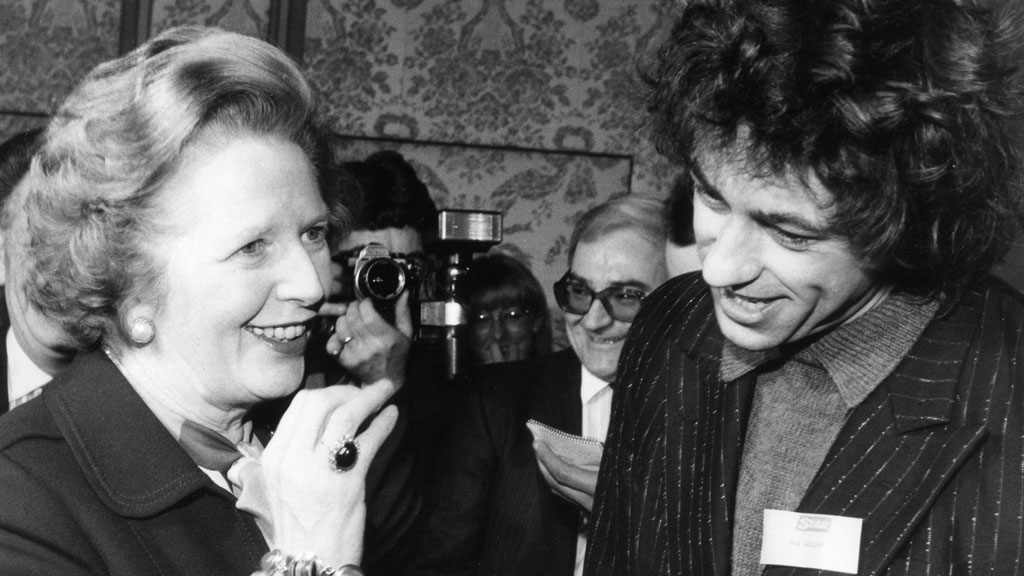Thatcher’s pop legacy – protest songs or the charity single?
Margaret Thatcher spawned a wave of protest songs. But then came 1984’s Do They Know It’s Christmas which gave miners’ benefit records an air of axe-grinding and pettiness, writes Bob Stanley.

The Angelic Upstarts were a second wave punk group from the shipbuilding town of South Shields. In 1981 they put out a record called 2,000,000 Voices about the size of the fast-growing dole queue – so fast growing, in fact, that every time he played it John Peel would comment that the figure was now edging closer to 3,000,000.
Margaret Thatcher became unavoidable subject matter in pop almost as soon as she was elected. Yet, though she cast an unavoidable shadow, there was no unified approach to post-Thatcher pop, and no specific sound to it; protest could come in the form of global resistance (Working Week’s Venceremos) or irony (Heaven 17’s We Don’t Need This Fascist Groove Thang). It was reactive – to unemployment (2,000,000 Voices, and UB40’s One In Ten), to the Falklands war (Crass’s bilious How Does It Feel To Be The Mother Of 1,000 Dead and Elvis Costello’s weary Shipbuilding) and to the miners’ strike.
The Style Council released The Big Boss Groove as a single in 1984 just as the miners’ strike began: “You may think you’re weak but together we could be so strong.” Initially the strike had widespread popular support – it’s easily forgotten that Wham!, the biggest pop act of 1984, played a miners’ benefit at the Festival Hall in September. It even felt as if anti-government sentiment was set to fuse with emerging musical forms when the Enemy Within’s Strike! used samples and the tools of hip hop to make its point.
People striking to save their jobs couldn’t compete with the media-swallowing story of Band Aid
Instead 1984 turned out to be a line in the sand. Anger had led to resignation on UB40’s If It Happens Again, their reaction to the 1983 election: “If it happens again I’m leaving, I’ll pack my things and go… I won’t say I told you so.” It reached the top 10 in the autumn of 1984 and, looking back, it feels like the last hit of a defined era. A record came out at Christmas that completely changed the nature of protest records.
Band Aid’s Do They Know It’s Christmas is possibly the most influential Thatcher-era single. Bob Geldof (pictured above) was keen to make both the single and the ensuing Live Aid show completely apolitical – Paul Weller may have been on board, but so were Status Quo and Queen who had both played Sun City (a South African resort which had come to symbolise the country’s apartheid era).
Margaret Thatcher loved Band Aid. “What fascinated me was this” she told Smash Hits: “it was not ‘why doesn’t the government give more?’ but ‘what can I do as a person?’. That was (Bob Geldof’s) approach.”
Do They Know It’s Christmas crushed all argument; it gave miners’ benefit records like the Council Collective’s Soul Deep an air of axe-grinding and pettiness. People striking to save their jobs couldn’t compete with the media-swallowing story of Band Aid, and the images of starving children.
The Red Wedge movement would come later, but what memorable hit records came out of it? Band Aid was about community, not society. It led directly to the huge-selling charity singles that have dotted the charts ever since: Children In Need, Comic Relief, Military Wives, Dunblane, Haiti. These aren’t protest records. They are about pseudo-collectivism, people asking themselves what they can do to help rather than what the government should be doing, just as Margaret Thatcher wanted.
This is her pop legacy. Shipbuilding may be the greater song, but Peter Kay has had more number ones than Elvis Costello.
Bob Stanley is a writer and musician who performs with Saint Etienne